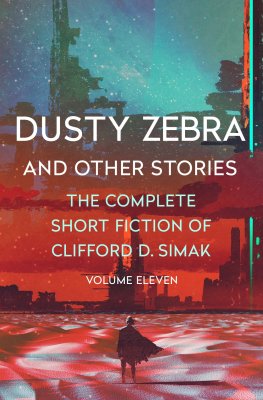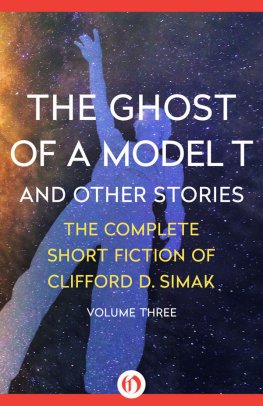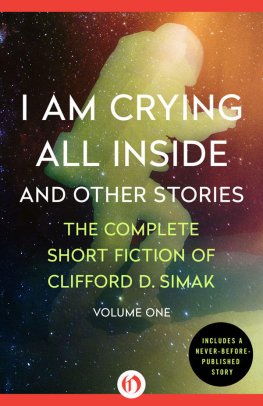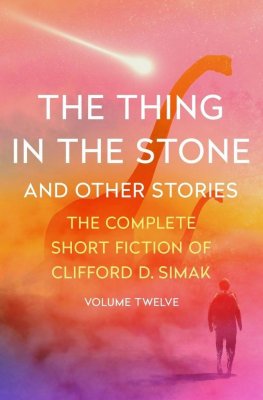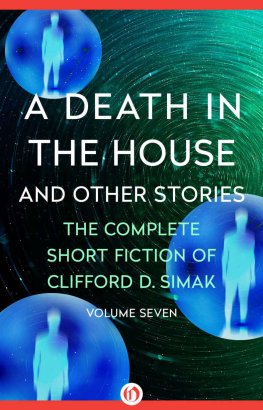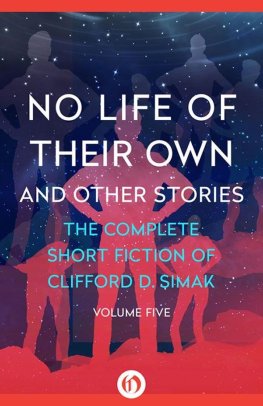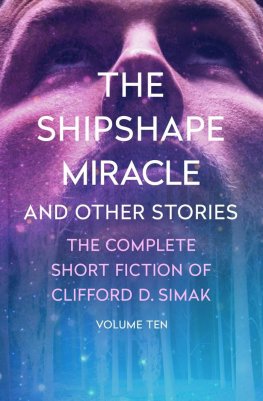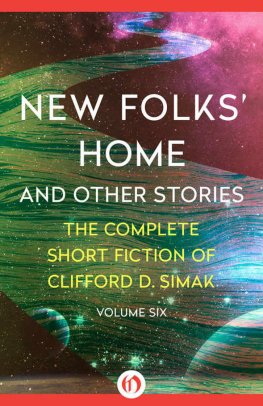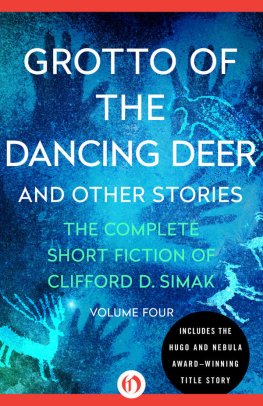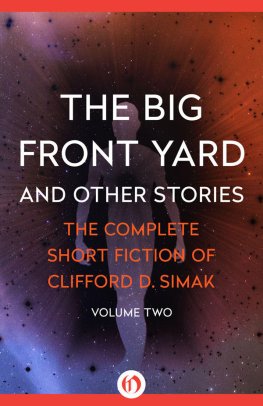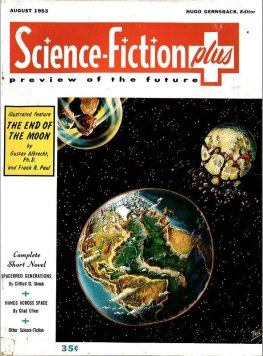Dusty Zebra
And Other Stories
The Complete Short Fiction of Clifford D. Simak, Volume Eleven
Introduction
Clifford D. Simak: Opinions of a Reticent Author
by David W. Wixon
Destiny, the way you made your life, the way you shaped your livingthe way it was meant to be, that way that it would be if you listened to the still, small voice that talked to you at the many turning points and crossroads.
Clifford D. Simak, in Time and AgainClifford D. Simak fell in love with science fiction when he was very youngand when the field itself was very young. Science fiction magazines were a new thing, and they were desperate for material. It did not take a great deal of ability to become a science fiction writer in those days, Cliff would later saythere just was very little competition. That would change quickly, of course, as the new writers learned their craft by doing.
That early science fiction, Cliff would one day tell interviewer Darrell Schweitzer, was something new, and it was wonderful. It was not well written, but we didnt know it at the time. I realized years later that it was badly written.
But becoming better at his craft was important to Cliff Simak, and he would become known as a true craftsman. As such, he would occasionally comment on his past work (not often; for him a work, once finished, was a done thing, not to be tampered with or second-guessed).
Madness from Mars (1938) and Sunspot Purge (1940), for instance, were two stories he would later regret in public. In later years he would say that they were truly horrible examples of an authors fumbling agony in the process of finding himself. It is possible the discerning reader may discover in them some of the seeds of later writing, but I cringe at their being read. (Note: This editor and reader found something good in both.)
What other stories was Cliff particularly proud of? Or not? (Check the guide at the very end of this article to find out which collection contains each story.)
Cliff would later tell a bibliographer that he was elated with Auk House and The Marathon Photograph, but he did not really explain his reasons for that feeling. Having worked out a story he initially called the stamp story, Cliff would later note in a journal that it (Leg. Forst.) turned out to be a better story than I thought it was.
He confided in his journal that a story called Realtor (which would become Carbon Copy) writes smoothly and easily. A story that first appeared in Cliffs journal as Rats in the Walls turned out to be The Big Front Yard, which he would describe as perhaps the best example of a first-contact story as I have done.
On the other hand, Cliff would describe Good Night, Mr. James as so vicious that it is the only one of my stories adapted to television (I read that as a pretty vicious comment about television, too.) It is so unlike anything I have ever written, he continued, that at times I find myself wondering how I came to do it.
But The Sitters, Cliff later said, was the most tender story I have ever written. It had, he said, that quality of compassion and human need that I have often attempted but never made come off so well. He also felt that he did a very good job with The Thing in the Stone; The Ghost of a Model T, which he felt was closer to the spirit of the early 1920s than all the books that have been devoted to it; and The Autumn Land. (The latter story he described as one of the few stories I wrote on orderCliff was to be Guest of Honor at the 1971 World Science Fiction Convention, and the people at the Magazine of Fantasy and Science Fiction had asked him for a story they could publish in conjunction with that appearance. Cliff would later write, No writer, of course, is ever completely satisfied with what he writes. He sees failures in it and often wishes he might have done it somewhat differently. But this, in my case, is less true of Autumn Land than of any other title Ive written.)
Cliff Simak considered his first novel, The Cosmic Engineers, to be a failure. He had never, at that point, written at novel length, but John W. Campbell Jr., the editor of Astounding Stories, asked him to do a story that could be serialized, and Cliff obliged.
Cliff would later tell Sam Moskowitz that he had hoped to blend some of the grassroots feel of ordinary people (a technique he had begun with Rule 18 a couple of years earlier) into the book, but found that sometimes you had to be grandiose in spite of yourself. (I will note that while this makes it sound as if the perceived failure was partially a matter of technique, it was really the case that Cliff did not meet his own expectationshe was still learning how to be the writer he wanted to be.)
Some years later a new novel presented Cliff with a bit of a quandary: Galaxy had purchased Destiny Doll with the intention of publishing it as a serial in its new magazine, Worlds of Fantasy, which was to be edited by Lester del Rey. But del Rey soon realized that the new magazine was not going to survive in the marketplace long enough to allow publication of all of Destiny Doll, and so he asked Cliff to condense it to fit into a single issue.
So I sat for a long time, Cliff would later say, thinking whether or not I should cut that much or give him back the money he had paid for it. I needed the money so I cut it in half and ruined it absolutely. (Cliff would find it ironic that the cut version, which appeared in what was indeed the last issue of the magazine under the title Reality Doll, would go on to be nominated for a Nebula Award.)
The novel Out of Their Minds, Cliff would later say, probably has the best critical potential of anything Ive written, that he got such a kick out of writing Goblin Reservation, and that Mastodonia was plain fun to write.
But A Choice of Gods presented an entirely different situation. At the time I wrote it, he would later say, I wrote with hunched shoulders: I knew there was no plot line; the tale didnt have a hero; it didnt have a villain; and there was no action. But it did have something to say. My agent was appalled.
But then the publisher gave Cliff the biggest advance they had ever given me on a story.
Finally, Id like to tell you the story Cliff told me, one day when I tried to explain to him how much his novel Way Station had meant to me when I read it as a teen.
At the time, he explained to me, the drivers at his newspaper had gone out on strike, and his guild had decided to honor the picket line. It was going to be a long strike, Cliff knew, and he only had a thousand dollars in the bank (money went a lot farther in the early 1960s, of course, but he had a family to support.)
He had been about to go out looking for a job, he told me, when he abruptly realized, late one night, that he already had a job: he had a novel already started, with about 40 pages written.
So the next morning he began a regimen of sitting down to write at 8 am, taking off an hour at noon, and then working the rest of the day.
He hated it. Writing, for Cliff Simak, did not work that way. But he was nothing if not disciplined.
He finished the book, sent it to his agent, and received, a bit later and while the strike was still going on, a check for $2500. And he won a Hugo Award for the book.
David W. Wixon * * *
The stories mentioned in this introduction can be found in the following collections:
Madness from Mars can be found in Volume One, I Am Crying All Inside and Other Stories.
The Big Front Yard can be found in Volume Two, The Big Front Yard and Other Stories.
Leg. Forst., The Autumn Land, and The Ghost of a Model T can be found in Volume Three,

